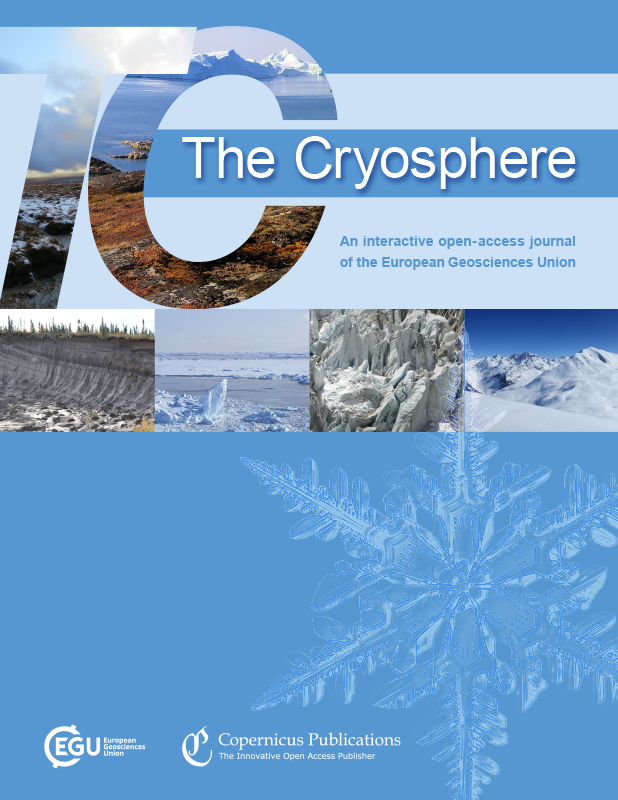A one-dimensional temperature and age modeling study for selecting the drill site of the oldest ice core near Dome Fuji, Antarctica
IF 4.4
2区 地球科学
Q1 GEOGRAPHY, PHYSICAL
引用次数: 5
Abstract
Abstract. The recovery of a new Antarctic ice core spanning the past ∼ 1.5 million years will advance our understanding of climate system dynamics during the Quaternary. Recently, glaciological field surveys have been conducted to select the most suitable core location near Dome Fuji (DF), Antarctica. Specifically, ground-based radar-echo soundings have been used to acquire highly detailed images of bedrock topography and internal ice layers. In this study, we use a one-dimensional (1-D) ice-flow model to compute the temporal evolutions of age and temperature, in which the ice flow is linked with not only transient climate forcing associated with past glacial–interglacial cycles but also transient basal melting diagnosed along the evolving temperature profile. We investigated the influence of ice thickness, accumulation rate, and geothermal heat flux on the age and temperature profiles. The model was constrained by the observed temperature and age profiles reconstructed from the DF ice-core analysis. The results of sensitivity experiments indicate that ice thickness is the most crucial parameter influencing the computed age of the ice because it is critical to the history of basal temperature and basal melting, which can eliminate old ice. The 1-D model was applied to a 54 km long transect in the vicinity of DF and compared with radargram data. We found that the basal age of the ice is mostly controlled by the local ice thickness, demonstrating the importance of high-spatial-resolution surveys of bedrock topography for selecting ice-core drilling sites.选择南极富士巨蛋附近最古老冰芯钻探地点的一维温度和年龄模型研究
摘要一个跨越过去的新南极冰芯的恢复 150万年将促进我们对第四纪气候系统动力学的理解。最近,为了在南极洲圆顶富士(DF)附近选择最合适的冰芯位置,进行了冰川学实地调查。具体而言,地基雷达回波探测已被用于获取基岩地形和内部冰层的高度详细图像。在这项研究中,我们使用一维(1-D)冰流模型来计算年龄和温度的时间演变,其中冰流不仅与与前冰川-间冰川周期相关的瞬态气候强迫有关,还与通过演变的温度剖面诊断的瞬态基底融化有关。我们研究了冰厚度、堆积速率和地热通量对年龄和温度剖面的影响。该模型受到DF冰芯分析重建的观测温度和年龄剖面的约束。敏感性实验结果表明,冰厚度是影响冰龄计算的最关键的参数,因为它对基底温度和基底融化的历史至关重要,可以消除老化。将一维模型应用于 km长的样带,并与雷达数据进行了比较。我们发现,冰的基底年龄主要由当地的冰厚度控制,这表明基岩地形的高空间分辨率调查对选择冰芯钻探地点的重要性。
本文章由计算机程序翻译,如有差异,请以英文原文为准。
求助全文
约1分钟内获得全文
求助全文
来源期刊

Cryosphere
GEOGRAPHY, PHYSICAL-GEOSCIENCES, MULTIDISCIPLINARY
CiteScore
8.70
自引率
17.30%
发文量
240
审稿时长
4-8 weeks
期刊介绍:
The Cryosphere (TC) is a not-for-profit international scientific journal dedicated to the publication and discussion of research articles, short communications, and review papers on all aspects of frozen water and ground on Earth and on other planetary bodies.
The main subject areas are the following:
ice sheets and glaciers;
planetary ice bodies;
permafrost and seasonally frozen ground;
seasonal snow cover;
sea ice;
river and lake ice;
remote sensing, numerical modelling, in situ and laboratory studies of the above and including studies of the interaction of the cryosphere with the rest of the climate system.
 求助内容:
求助内容: 应助结果提醒方式:
应助结果提醒方式:


